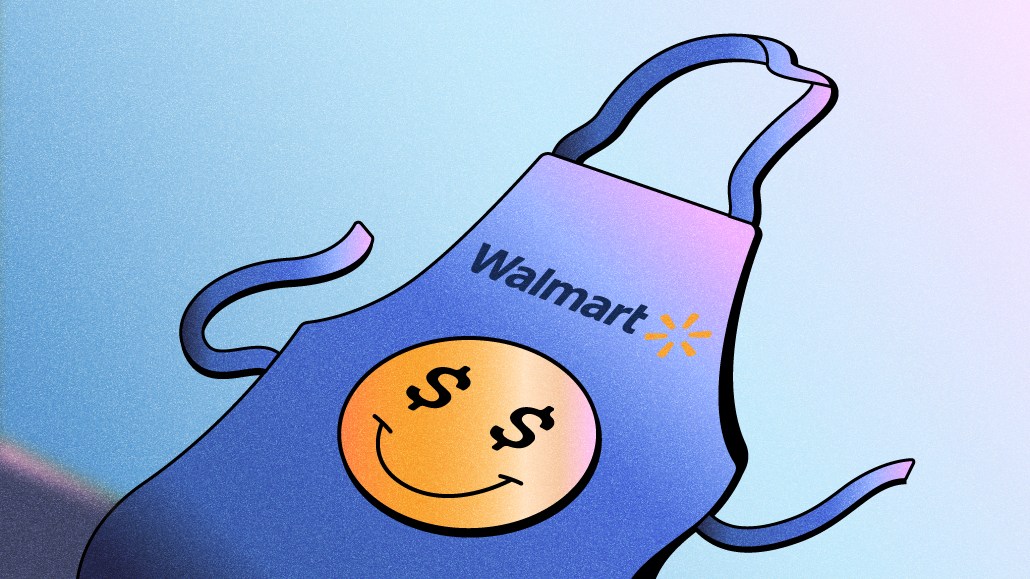Secure your place at the Digiday Publishing Summit in Vail, March 23-25
Walmart and Roblox are teaming up to make virtual e-commerce a reality

As of today, Walmart is able to sell physical goods directly to users inside Roblox.
The introduction of real-life e-commerce could be a watershed moment for the company’s ambitions to become an all-encompassing destination for virtual life.
Walmart’s Roblox e-commerce experience launches later today, with users inside the pre-existing Walmart Discovered able to have real-life items shipped directly to their doorsteps. Users entering the experience will be greeted with a new storefront showcasing virtual twins of select physical items sold at real-life Walmart stores.
After trying out the virtual items on their avatars, players will be able to load an e-commerce experience that takes the form of a browser window inside Roblox imitating the experience of shopping on Walmart’s website — essentially a virtual laptop set up inside Roblox to access Walmart.com. The commerce feature within Walmart Discovered will be gated specifically to users aged 13 or older in the United States only.
“There is a traditional sort of checkout flow where you put your name, your address and your credit card information, and that’s all powered by a Walmart API that handles all of the information super securely — it’s very safe,” said Walmart director of brand experiences and strategic partnerships Justin Breton. “And once you hit checkout, you’ll get your confirmation email from Walmart. All of that is handled by us on the back end, the user will then get their item in the mail, but the virtual twin is granted immediately back on Roblox.”
To promote the e-commerce experience, Walmart collaborated with three Roblox creators — Sarabxlla, MD17_RBLX and Junozy — to design Robloxified versions of three physical Walmart products, which include a No Boundaries festival hobo bag, a TAL stainless steel tumbler and Onn wireless headphones.
Roblox first teased the launch of e-commerce during November’s Roblox Investor Day, and the Walmart experience is a pilot test that will run through the month of May. During the pilot test, Roblox will not receive a cut of item sales, with all revenues going directly to Walmart. Instead of acting as a new revenue stream for Roblox in the short term, the test will gauge users’ willingness to purchase physical goods on the platform.
Today’s pilot test is the first of multiple e-commerce tests that Roblox is planning with different products, brands and shopping methodologies. When it all shakes out, it’s possible that future e-commerce experiences on the platform will ultimately look very different than Walmart’s pilot test.
“We are excited to start testing real-world commerce as a key step towards enabling it in the future for our community of creators and brands,” said Roblox vp of economy Enrico D’Angelo. “Shopping for virtual items is already an important element of how people engage and express themselves on Roblox daily, so our goal is to gather feedback, test the technology and learn what resonates with Gen Z customers the most when it comes to shopping for physical items.”
Platform status
Much like Roblox’s push to evolve into an ad network, which kicked into high gear last year, the company’s expansion into e-commerce highlights its aspirations to transcend its origins as a gaming company to become a full-fledged digital platform. If all goes well, the platform’s leaders hope to steer it to much greater heights, similar to the evolution of Facebook from a social platform into a destination for shopping and dating, or to Amazon’s expansion from bookselling into gaming and streaming video.
“Our vision for shopping as part of the Roblox economy: it will ultimately model the physical world, with the ability to go above and beyond by overcoming physical limitations and offering added value to shop on the platform,” D’Angelo said.
The opportunity of Roblox e-commerce extends beyond dedicated retailers such as Walmart. The ability to sell physical goods through Roblox represents a concrete revenue stream that is attractive to just about any brand with its own Roblox world — the equivalent of a merchandise booth at a music festival or sports game.
“Even for those where you might not think about it directly as an e-commerce type of client, all of them have e-commerce connected to it, especially for sports brands and leagues,” said Marcus Holmström, CEO of the Roblox development studio The Gang, which has developed numerous Roblox experiences for sports brands such as FIFA and Wimbledon. “FIFA, for example — in every World Cup, they have official stores. So if they move the official store into Roblox, it opens up a worldwide market.”
Walmart has aspirations beyond its own e-commerce experience, too. If May’s pilot test goes well, the retailer has no plans to take down the e-commerce storefront inside Walmart Discovered. On the contrary, Walmart is looking to expand its e-commerce presence on Roblox, with dreams of potentially becoming the default commerce provider for experiences across the gaming platform.
“We will learn together; we will optimize together,” Breton said. “And, hopefully, there’s a future state where Walmart’s powering commerce in Walmart Discover, but in other experiences. I think the future’s bright, and there’s a lot of opportunity to use our learnings to inform a different road map for the future.”
More in Marketing

As it ramps up push to fund AI bets, Meta makes a new play for agencies
Even in the age of Advantage+, Meta needs agencies.

Zero-click reality is rewriting the rules of search for brands
Search performance concerns have reached brand boardrooms. Both organic and paid search practitioners are scrambling to find effective responses to the questions posed by AI developments.

Walmart Connect’s full-funnel ambitions come into focus, with Amazon in its sights
Walmart Connect is scaling quickly, with AI investments and the Vizio acquisition shaping its push to rival Amazon’s ad business.








